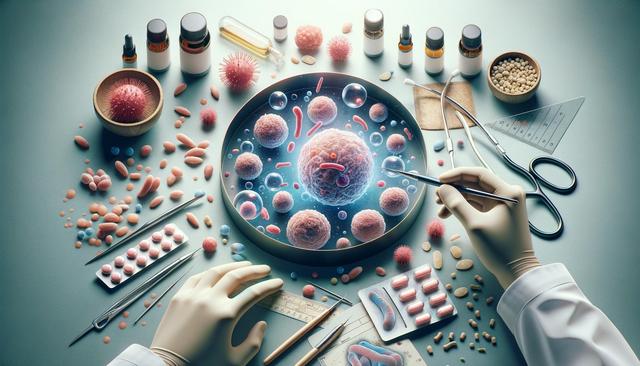The Nature of Cancer Cell Growth
Cancer cells differ from normal cells in that they grow uncontrollably, often forming masses called tumors. This unregulated growth is caused by genetic mutations that affect how cells divide and die. Unlike normal cells, cancer cells do not respond to the body’s signals that regulate cell cycle, leading to persistent growth. Understanding this process is essential in identifying ways to stop or slow down cancer cell proliferation. Researchers focus on how these cells evade the immune system, avoid programmed cell death (apoptosis), and sustain their growth signals. These insights help shape the foundation for developing treatment strategies targeting specific behaviors of cancer cells.
Key characteristics of cancer cells include:
- Ability to grow without external signals
- Resistance to signals that stop cell division
- Ability to invade surrounding tissues
- Capacity to create new blood vessels (angiogenesis)
- Tendency to metastasize to other parts of the body
By studying these traits, researchers aim to find vulnerabilities that can be targeted through medical intervention or lifestyle changes.
Targeted Therapies and Drug Development
One promising approach in stopping cancer cell growth is the development of targeted therapies. These treatments are designed to interfere with specific molecules involved in tumor growth and progression. Unlike traditional chemotherapy, which affects both healthy and cancerous cells, targeted therapies aim to minimize damage to normal tissue. This precision improves treatment outcomes and reduces side effects for patients. Some therapies block the enzymes or proteins that cancer cells need to grow, while others target the blood supply that nourishes tumors.
Examples of targeted therapy mechanisms include:
- Inhibiting tyrosine kinase enzymes that signal cell division
- Blocking hormone receptors in hormone-sensitive cancers
- Preventing angiogenesis to starve tumors of nutrients
- Targeting specific genetic mutations found in cancer cells
Ongoing clinical trials continue to evaluate how effective these therapies are in different types of cancers. Personalized medicine, which tailors treatment based on a patient’s genetic profile, plays a significant role in improving the success rate of targeted therapies.
Role of Immune System in Controlling Cancer
The immune system plays a critical role in identifying and destroying abnormal cells, including cancer cells. However, many cancers develop mechanisms to evade immune detection. Immunotherapies are an evolving area of cancer treatment that aim to strengthen the immune response against tumors. These therapies work by helping immune cells recognize and attack cancer cells more effectively.
Common types of immunotherapy include:
- Checkpoint inhibitors that block proteins used by cancer cells to escape immune attacks
- Cancer vaccines that stimulate the immune system to target specific cancer antigens
- Adoptive cell therapy, where immune cells are modified and reintroduced to the body
By leveraging the body’s natural defense system, immunotherapies offer a promising path to prevent cancer cell growth and recurrence. However, not all patients respond equally to such treatments, making ongoing research essential to understand individual variations.
Lifestyle and Prevention Strategies
While medical treatments are vital, lifestyle changes can also play an important role in reducing cancer risk and supporting the body’s ability to manage abnormal cell growth. Numerous studies suggest that healthy habits can influence cell behavior and potentially reduce the chances of cancer cells proliferating. Nutrition, physical activity, and avoiding harmful substances are important components of a preventive approach.
Recommendations for reducing cancer risk include:
- Eating a diet rich in vegetables, fruits, whole grains, and lean proteins
- Maintaining a healthy weight to reduce inflammation and hormonal imbalances
- Exercising regularly to improve immune function and cellular repair
- Avoiding tobacco and limiting alcohol intake
- Reducing exposure to carcinogens in the environment and workplace
Integrating these habits into daily life can contribute to overall wellness and may support the body’s efforts to suppress cancer cell development.
Monitoring and Early Detection
Stopping cancer cell growth is most effective when the condition is detected early. Regular screenings and health checkups can identify abnormal cell changes before they become malignant or spread to other areas. Technologies such as imaging studies, blood tests, and biopsies help monitor potential signs of cancer. Early detection allows for timely intervention, which significantly improves patient outcomes.
Diagnostic tools commonly used include:
- Mammograms for breast abnormalities
- Colonoscopy for colorectal polyps
- Pap tests for cervical cell changes
- Low-dose CT scans for lung cancer in high-risk individuals
In addition to medical surveillance, genetic testing can help identify individuals at higher risk due to inherited mutations. This allows for more personalized prevention and monitoring strategies. By staying informed and proactive, individuals can contribute meaningfully to controlling the potential spread of cancer cells.


